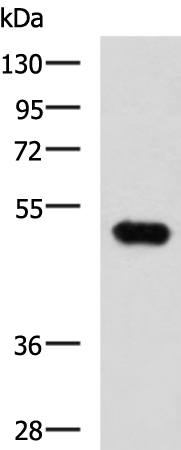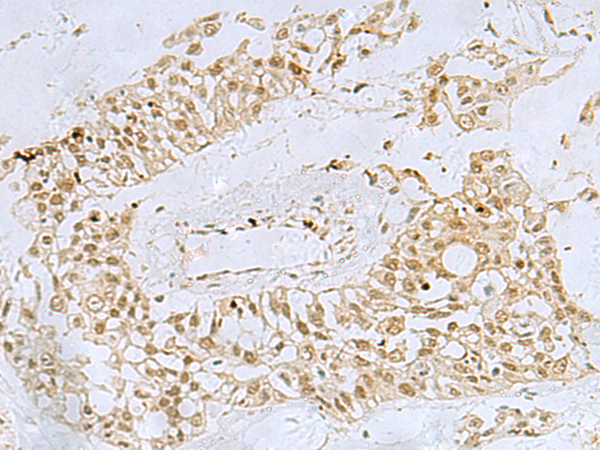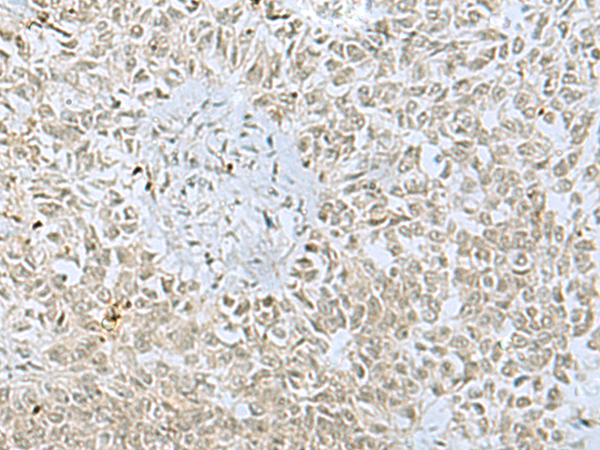


| WB | 咨询技术 | Human,Mouse,Rat |
| IF | 咨询技术 | Human,Mouse,Rat |
| IHC | 1/25-1/50 | Human,Mouse,Rat |
| ICC | 技术咨询 | Human,Mouse,Rat |
| FCM | 咨询技术 | Human,Mouse,Rat |
| Elisa | 1/5000-1/10000 | Human,Mouse,Rat |
| Aliases | HFH1 |
| WB Predicted band size | 42 kDa |
| Host/Isotype | Rabbit IgG |
| Antibody Type | Primary antibody |
| Storage | Store at 4°C short term. Aliquot and store at -20°C long term. Avoid freeze/thaw cycles. |
| Species Reactivity | Human |
| Immunogen | Synthetic peptide of human FOXQ1 |
| Formulation | Purified antibody in PBS with 0.05% sodium azide and 50% glycerol. |
+ +
1. **文献名称**:*FOXQ1 promotes colorectal cancer metastasis through upregulation of Snail*
**作者**:Zhang H. et al.
**摘要**:该研究利用FOXQ1抗体通过免疫组化分析发现,FOXQ1在结直肠癌中高表达,并通过激活Snail蛋白促进肿瘤转移,提示其作为预后标志物的潜力。
2. **文献名称**:*FOXQ1 regulates epithelial-mesenchymal transition in breast cancer via Wnt/β-catenin signaling*
**作者**:Wang Y. et al.
**摘要**:研究通过Western blot和免疫荧光技术(使用FOXQ1抗体)证实,FOXQ1通过调控Wnt通路驱动乳腺癌上皮-间质转化(EMT),促进侵袭和转移。
3. **文献名称**:*FOXQ1 as a novel therapeutic target in gastric cancer stem-like cells*
**作者**:Li X. et al.
**摘要**:利用FOXQ1抗体进行流式细胞术和ChIP实验,揭示FOXQ1在胃癌干细胞中高表达,并通过调控Sox2维持干性,为靶向治疗提供依据。
4. **文献名称**:*FOXQ1 inhibits apoptosis in hepatocellular carcinoma by transcriptionally activating Bcl-2*
**作者**:Chen L. et al.
**摘要**:通过免疫组化(FOXQ1抗体)和双荧光素酶报告基因实验,证明FOXQ1通过上调Bcl-2抑制肝癌细胞凋亡,促进肿瘤耐药性。
The FOXQ1 antibody is a crucial tool for studying the FOXQ1 protein, a member of the Forkhead box (FOX) transcription factor family. FOXQ1. encoded by the *FOXQ1* gene, regulates gene expression by binding to DNA via its conserved forkhead domain. It plays pivotal roles in embryonic development, cell differentiation, and tissue homeostasis. Recent research highlights its involvement in cancer progression, particularly in epithelial-mesenchymal transition (EMT), metastasis, and chemoresistance. Overexpression of FOXQ1 is linked to aggressive phenotypes in colorectal, breast, and gastric cancers, making it a potential prognostic biomarker and therapeutic target.
FOXQ1 antibodies are widely used in techniques like Western blotting, immunohistochemistry (IHC), and immunofluorescence (IF) to detect FOXQ1 expression and localization in tissues or cell lines. These antibodies aid in elucidating FOXQ1's molecular mechanisms, such as its interaction with Wnt/β-catenin and TGF-β signaling pathways. Commercial FOXQ1 antibodies are typically raised in hosts like rabbits or mice, targeting specific epitopes (e.g., N-terminal regions). Validation includes knockout cell controls and recombinant protein assays to ensure specificity.
Research utilizing FOXQ1 antibodies continues to expand, offering insights into its dual roles as an oncogene or tumor suppressor, depending on context. This underscores the antibody's importance in both basic research and clinical applications.
×